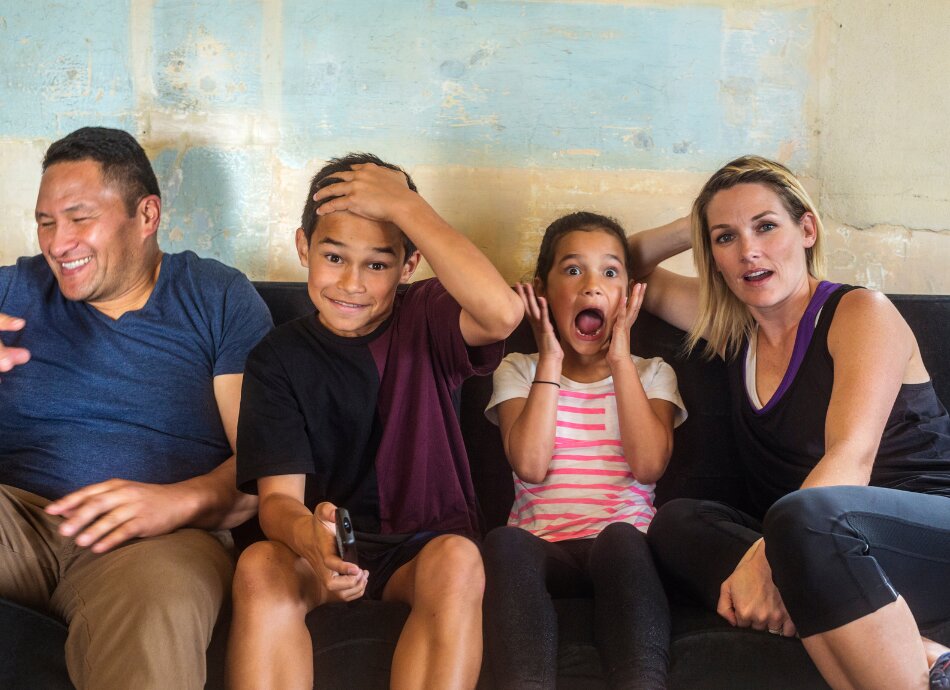Start the conversation early
Talking to your kids in an age-appropriate way from a young age about things like body parts, consent, relationships, feelings and respect can make the conversation about porn easier as they get older. It’s also better if you talk to them about porn, if possible, before they see it to help prepare for any shock or confusion they may experience when seeing it. This also helps them know you are a safe person they can go to when they first come across it. If your tamariki are older and/or may already be watching porn, acknowledge that the subject can feel a bit awkward but that you're keen to hear their views, that you won't judge them and you're here to support them.
Look for teachable moments
Sometimes the right moment to raise the topic will present itself naturally. Maybe you have just seen an adult scene in a TV show you were watching together and you could ask your tamariki what they understood of it. Media literacy and learning how to think critically will be something they engage with at school so you can extend this into watching media at home. What they say about sex will relate to how they view porn as well.
Take a shame-reduction approach
Young people tell us that shame is the biggest barrier to having porn conversations with parents Ways to reduce shame include firstly reflecting on our own personal beliefs and biases around porn; taking an open, calm, curious and compassionate approach; avoiding words like ‘bad’ and ‘wrong’; and listening empathically and hearing our kids’ perspectives.
Normalise responses to porn
Many young people experience conflicting and confusing feelings when they first see porn. These can include curiosity, shame, disgust, excitement, confusion fear and/or arousal – or some (or all) of these at the same time. It’s important kids understand that any response to porn is normal and okay – and that you are a safe and non-judgemental person they can unpack their feelings with.
Encourage critical thinking around porn
Use open questions that can help build curiosity and stimulate critical thinking around porn. For example, exploring and reflecting on the messages in porn around gender, violence and sexism can open up conversations beyond ‘good or bad’, draw out young people’s own ideas and understandings, and help them to develop their own ethics around sexuality and sexual responsibility.
Talk about consent and sexual aggression
Porn shows a lot of sexual aggression towards women and little consent. Discuss together how this gives unhealthy portrayals of mutual pleasure, respect and communication, and how the lack of consent can give problematic messages to viewers. Ask them how these portrayals of violence and consent align with their own personal views to help build critical thinking around the themes in porn.
Talk about how porn portrays gender
Talk about how women, men and sexually and gender diverse people are portrayed in pornography. Is the balance of power equal? Is sex something happening to them or are they all equal, willing partners. How are men portrayed? Are they the aggressors? How are LGBTQI+ actors portrayed? Does it look like women enjoy aggression? Discuss together how these themes in porn sit with your kids’ own views and beliefs about gender.
Be open to questions
Be open to any questions your kids may ask about porn or what they’ve seen. They may also have questions about sex and relationships in the real world. Be honest and let them know they can ask you anything. Try to stay calm and unshockable if they come to you with something upsetting or confusing they've seen. Provide comfort and reassurance and let them know however they feel is okay and you are a safe person to process their feelings with. If you don't have the answers straight away that's okay too – let them know you'll get back to them.
Let them know you're available to talk
Choose the right moment to talk to them, with a shame-free and open approach. It might be on a private, quiet car ride, on a walk or while you're doing an activity together. If you hit a brick wall when you raise the subject, just be patient and try again later. At least by showing you're open and keen to have a conversation, they might bring up the subject in their own time.
Assure them it’s okay to choose not watch porn
Peer pressure can be a strong influence on kids. Let them know it’s okay to choose not to watch porn and to speak up if they don’t feel comfortable and porn doesn't align with their own values and ethics. Some kids may also need specific help with responding to pressure from friends or in relationships.
Offer support if needed
Young people can struggle with a wide range of issues related to porn. This can include feeling uncomfortable with the content seen, pressure to try stuff from porn a partner has seen, porn affecting their sexual relationships, or wanting to cut down porn but struggling to. Ask your kids if they, or any of their friends are struggling and let them know you’re here to help.







